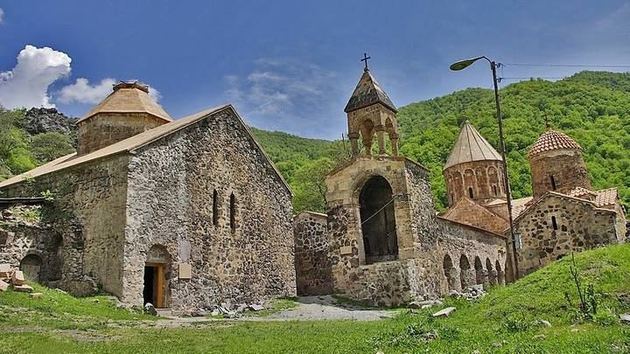The collapse of the Soviet Union restored the independent statehood of the three countries in the South Caucasus – Armenia, Azerbaijan and Georgia, but it took away the largely peaceful relations between or within them, Vasif Huseynov, a senior adviser at the Center of Analysis of International Relations of Azerbaijan writes in the article Opportunity for durable peace between Armenia and Azerbaijan should be seized for Euractiv.
The conflict has been truly a handcuff for fully-fledged regional cooperation, dramatically increasing the costs of regional transportation and energy routes, and as such also alienating the two people increasingly more against each other. The recent 44-day war (27 September- 10 November 2020) between Armenia and Azerbaijan has, in a certain sense, generated a unique chance for the restoration of peace between the two nations, who had lived peacefully in the past and continue to live so in other parts of the world where they are settled. There are several reasons why the post-war situation in the region can be deemed as conducive to lasting peace and security.
First and foremost, the war did not end with a maximalist victory or total defeat of one side against the other. This was a potential scenario before the ceasefire as acknowledged by Armenian Prime Minister Nikol Pashinyan who declared that Armenia “would be in a worse situation”, if the war did not end on 10 November. Notably, the Azerbaijani government demonstrated restraint and stopped the war immediately after Armenia agreed to withdraw its armed forces, as President Ilham Aliyev of Azerbaijan suggested from the very beginning of the war. In stark contrast to the fate of ethnic Azerbaijanis of the Karabakh region who were forcefully expelled by Armenian forces after the war in 1990s and never allowed to return, Armenians are living in Karabakh region of Azerbaijan and Baku expressed the intention to accommodate them as citizens with rights and privileges just as all other minorities in the country such as Jews, Russians, Kurds and others.
Secondly, the Azerbaijani government has stated officially that it considers the Nagorno-Karabakh conflict as resolved. “We have entered the process of the restoration of peaceful coexistence stage in the resolution of the conflict”, Azerbaijan’s Foreign Minister Ceyhun Bayromov announced in late November. The consideration of the conflict as resolved without a total victory is extremely important to reach a peace treaty as it leaves room for reconcilation between the governments, and also between the people of the two countries. There are already signs for the potential transformation of the conflictual environment into one of cooperation and joint projects. This is noteworthy that such messages are given by both sides. For example, Armenia’s newly appointed minister of economy, talking about the long-term possibilities for regional cooperation, did not rule out the establishment of trade relations between Armenia and Azerbaijan.
For the Azerbaijani government, there is a good opportunity to launch a larger cooperation platform including the countries of the South Caucasus and the countries neighbouring the region, namely Russia, Iran and Turkey. Stating that he had already discussed the issue with President Recep Tayyip Erdoğan of Turkey, President Aliyev said, in the press conference with his Turkish counterpart on 10 December in Baku, that “If the Armenian leadership draws the right conclusions from the war, renounces its unfounded claims and looks ahead, then they can also take a place on this platform. We are open to this… We must turn this page over, we must end the enmity.” President Erdoğan did likewise support the initiative saying that this was supported also by Russia’s President Vladimir Putin. He made clear that the platform would include infrastructure, political, diplomatic and many other issues.
Babken Tunyan, the head of an Armenian parliament committee on economic issues from the parliamentary majority My Step alliance, did not rule out Armenia’s participation in the platform, noting that “If participation in any platform corresponds to [Armenia’s] interests, then it should participate”. The peace messages from the conflicting sides and external stakeholders raises a hope that it can be eventually possible for the “Armenia-Azerbaijan conflict” to become as a matter of the past, as President Aliyev stated. This all creates a new situation that should not be taken granted by anyone who is interested in building peace between Armenia and Azerbaijan and ending the longstanding hostilities often accompanied by violence.






